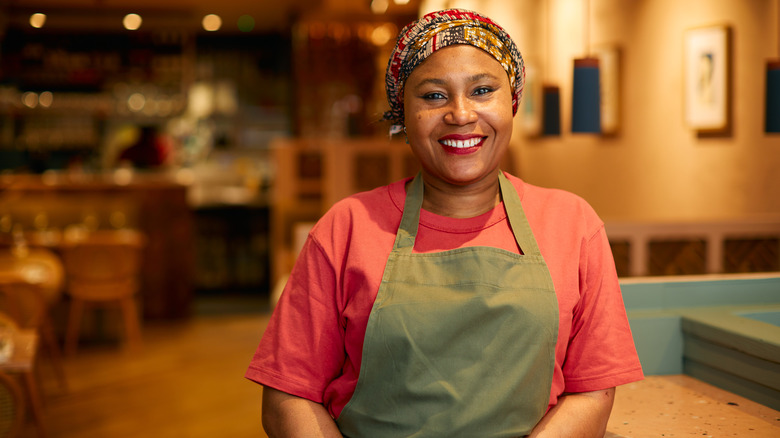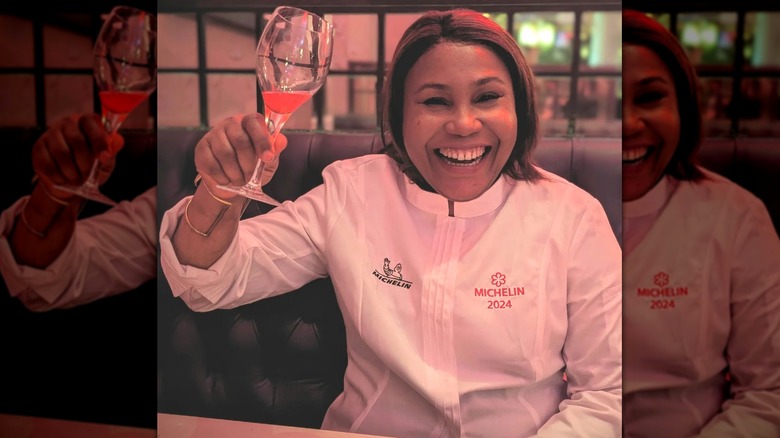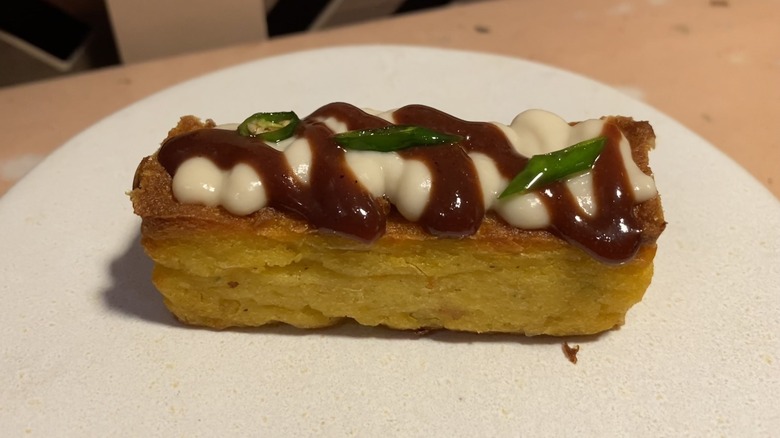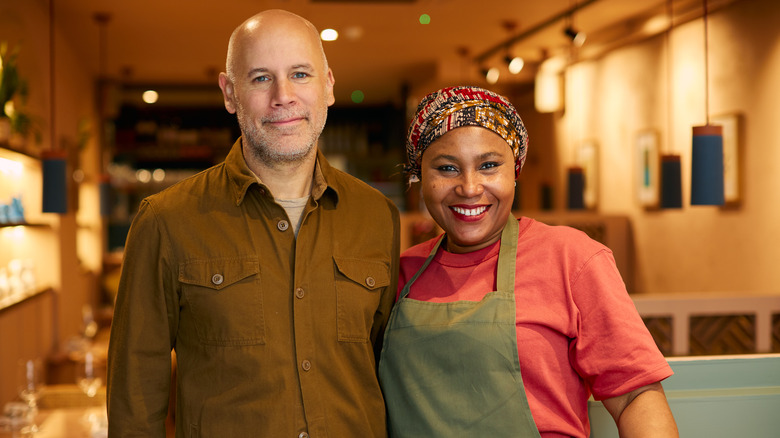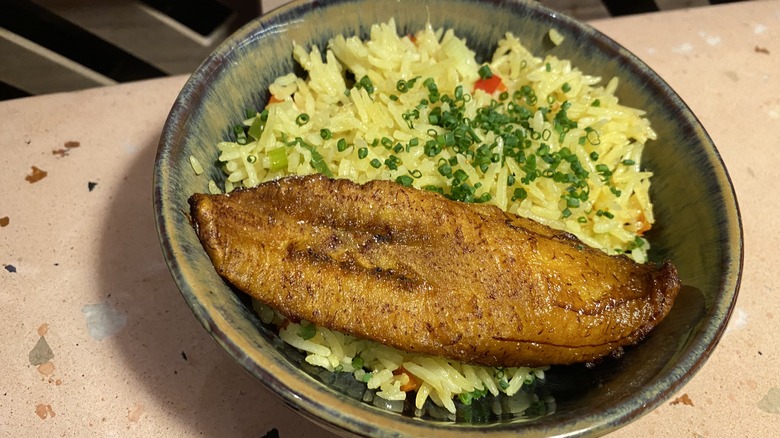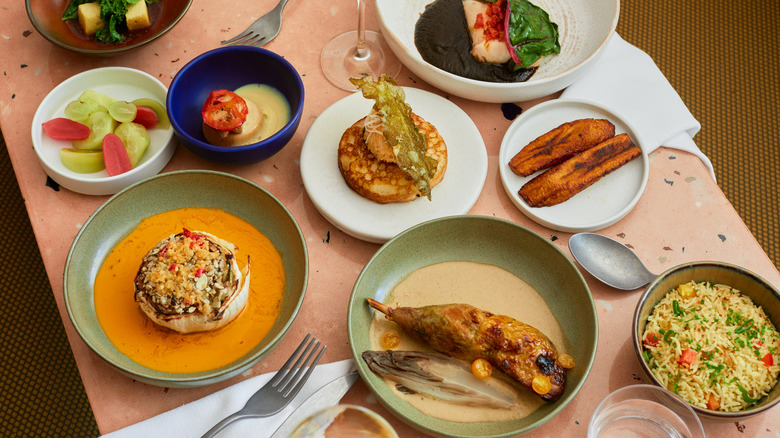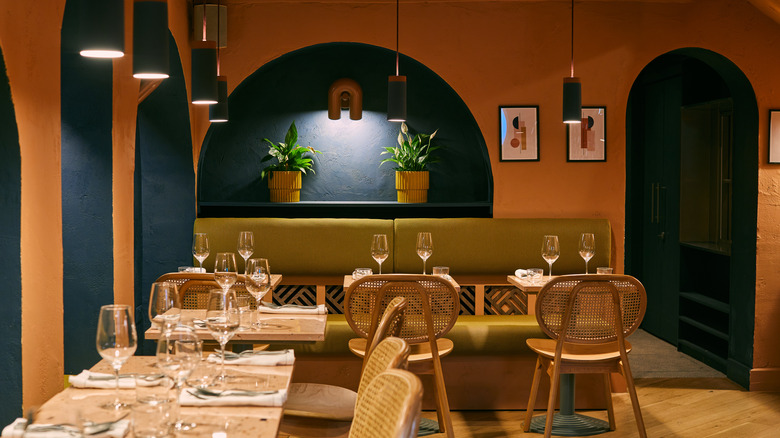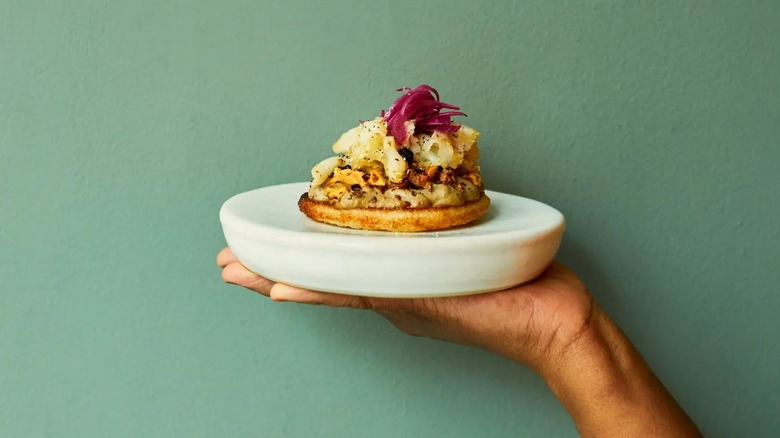Exclusive: Adajoké Bakare's Michelin-Starred Restaurant Is Defining West African Cuisine In London
Warm, relaxed, subtle, and intentional — these are all words that could be used to describe the atmosphere when walking into Chishuru, the recently relocated Fitzrovia-based restaurant of chef Adajoké (Joké) Bakare and her business partner and front-of-house manager Matt Paice. Based on the calm atmosphere, it's hard to believe that this became the recent home of the U.K.'s first-ever Michelin-starred Black female chef and the second in the world. It's an accolade that feels long overdue and simultaneously should include trumpets announcing Bakare's presence whenever she enters a room. Instead of trumpets, her food does the announcing, singing loudly with flavor and texture, prompting curiosity and delight in her guests.
Bakare first began this journey by hosting small, informal supper clubs around London. "It was just friends and family — honestly, just a very informal arrangement," she says. This value of generous hosting is a thread that continuously runs through Chishuru's history. The menu for both lunch and dinner is largely set, leaving guests only responsible for choosing their main course and drinks. Guests can also add an extra course, choosing from a list of just one between their starters and the main. The atmosphere already lends itself to a more relaxed and inviting dining experience by alleviating decision fatigue. I spoke with Bakare and Paice to learn more about how Bakare has created an atmosphere that allows guests to focus on engaging with the experience of the food, the atmosphere, and their own curiosities around West African cuisine.
What is the significance of a Michelin star within London or Europe's dining scene?
In an interview in late 2020 with Vittles founder Jonathan Nunn, Bakare discussed some of the reasons West African cuisine has been slow to catch on in the U.K., despite the numerous West African communities in London. Pinpoints range from the ability to source high-quality ingredients to popular critics' distinct lack of reviews for Black-owned businesses, to the public's unfamiliarity, hesitance to ask, or lack of connection with the region.
It isn't just newspaper critics who are faulted for notoriously overlooking and excluding women and chefs of color; the Michelin Guide is equally guilty of gatekeeping its prestigious accolade. In 2023, out of the 75 Michelin-starred restaurants in London, six were run by women and none were from a non-white background.
Bakare's Michelin-starred status does many things. First, it flags her unfettered talent, passion, and ability to break through some of the historically white, male, European gatekeeping within Britain's restaurant industry. Second, it also draws attention to the glaringly apparent Eurocentric bias and a massive hole in acknowledgment that has been normalized within the Michelin star accolade, subsequently downplaying the talent, contributions, and potential of Black women in the food industry.
What is it like to dine at Chishuru?
To dine at Chishuru is, in a word, joyous. The current set lunch menu includes two starters presented by staff with a detailed explanation of each ingredient. The sinasir, a fermented rice cake is topped with mushroom purée, cep and shitake mushrooms, crushed walnuts, and grains of paradise. Then there is ekoki, a layered corn cake peppered with candied chilies, topped with coconut cream, and a date and tamarind sauce. I chose the yassa, charcoal-grilled guineafowl breast nestled in an incredible caramelized onion and lemon sauce with yagi peanut spice for the main course. Alongside is a bowl of ginger and chili speckled rice, plantain dusted with the chili and lime salt, and a bowl of house pickles; each variety's made with a different brine. Dessert is Fonio ice cream, carob custard, peanut praline, and coconut crisp.
During the meal, Paice and I discuss Bakare's approach to cooking. He says, "So talking about sauces, in this restaurant, when we don't have customers, there is a blender running every single hour. Almost every dish has a sauce, it's what Michelin responded to as well. It's a terrible cliche to talk about a feminine approach to cooking, but unfortunately, I don't know another way; the feminine approach — the gentleness of the different elements in harmony — hopefully, you're going to get something the layers that go into the sauces, I really think is fundamental to understanding her approach to cooking."
How has chef Bakare helped pave the way for modern west African food in London?
It has taken its fair share of time, but West African food has begun to enter London's public eye over the last many years, thanks to the persistence, passion, and heavy lifting of folks like Bakare. "I wasn't really aware of any food scene. I wanted to cook the food of my heritage, the food I remembered growing up," she says.
Bakare and her family moved from Kaduna, Nigeria to London in 1999. With a full-time job in HR, Bakare began cooking the food of her childhood, drawing from the three main food traditions of the area: Yoruba, Igbo, and Hausa. The name Chishuru stems from Hausa, meaning "to eat in silence." This silence of delight and anticipation can be seen in real-time; it's what happens when Bakare's food arrives at the table.
Having dipped her toe into what she calls a "handful of supper clubs," Bakare was encouraged by friends to enter an amateur cooking competition, winning a three-month restaurant popup spot in Brixton Village. That was the start of her food-facing career that has catapulted her cooking into the hearts of Londoners and helped to pry open the category and discussion around what modern West African food can look like. She is adamant not to call her food solely Nigerian food, highlighting the natural overlapping of cuisines and ingredients as they travel back and forth over country borders and between families.
The evolution of Chishuru
The chatter about Barake's cooking began to spread up and down the tube lines. "Brixton Village, where the popup was, has been a popular destination for people searching out new food experiences for a few years now. It was all word of mouth really; journalist David J Paw was one of the first to come in, and he has a following," Bakare told me.
In late 2020, Chishuru was further boosted with a rave review by food critic Jay Rayner. The then-popup soon after became permanent. Chishuru remained in Brixton Village until 2022 when Bakare and business partner Paice began looking for a more central location. When the Brixton Village location closed in anticipation of the new spot, Bakare leaned into her warm hosting skills, taking up several residencies and pairing with well-known supper club host and chef Guan Chua, bringing together a mixture of West African and Nyonya influences and flavors into one meal.
Bakare says, "I've done a few collab dinners with good friends. I've cooked with my friend Guan Chua a couple of times — he's a proper supper club chef, cooking Nyonya food. When we did our popup at the Globe Tavern last summer, waiting for our Fitzrovia restaurant to open, I did particularly memorable collab dinners with Nick Bramham of Quality Wines and Sirichai Kularbwong [of Singburi] — those were great fun — and Guan again."
The importance of heat and chilies in Chishuru's menu
Paice references the cooking of Kularbwong as a means to compare Barake's use of chili peppers; the slow and gentle building of heat provides structure to the dishes in both styles of cuisine. He says, "She can eat Scotch bonnets like they're apples. She loves them. That's particularly Yoruban, so it's really important for her that she uses them... She uses it like tannins are used in red wine — to give structure."
Nothing I tried on the lunch menu could be described as overpoweringly hot or spicy; instead, it's measured and balanced, providing just as much flavor as it does tongue-tingling endorphins. However, the use of various peppers to create heat is a distinctive part of Bakare's cooking style and of the cultures from which she is drawing. The website acknowledges this directly, saying, "If you have no tolerance for spice at all, we recommend choosing a different restaurant, sorry."
Chishuru has evolved, but the heart remains the same
Paice tells us about the differences between the Brixton Village location and the new Fitzrovia venue. He says, "If you want to talk about evolution [of] Brixton to here, it'd be [the] number of elements in the dish. So previously, it might there might have been three elements. Now there's four or five, and that's basically replicated across the menu, really." The atmosphere that evokes generosity and warmth and a meal full of thought and flavor remains the same.
Modern West African food continues to build in London, with food and business ventures made by many looking to finally see the flavors of their family's heritage or culture represented outside their home, memories, or local community. Restaurants like Akoko (also recently awarded a Michelin star), Chuku, and Akara now keep older establishments like 805 company, as modern West African cuisine and interpretations become more accepted and acknowledged both within and outside communities with West African heritage.
Modern West African cuisine
As it continues making its way into public knowledge, those at the forefront of the modern West African movement, like Barake, often take on the additional role of gracious teacher or host. Paice and Bakare told Michelin in an interview following the ceremony that, although Chishuru has retained many loyal regulars, first from their Brixton location and now in their new spot, many of the restaurant guests they host are unfamiliar with West African cuisine. They consider it a rewarding part of their jobs to have the opportunity to teach, inspire, and help change any preconceptions or misconceptions of what West African or Nigerian food is. Even if it is rewarding in its needle-moving inclusivity, this is also an additional weight placed onto the shoulders of individuals that many others in the same position do not have to fill.
When we asked Bakare about the growth of the West African food scene now, compared to when she began her more public-facing efforts, she told us, "There are very, very few restaurants doing anything similar to what I'm doing. It's really us and Akoko, and even then there are stark differences between our approaches. Two Michelin-starred Ikoyi, run by my good friend Ire and his chef-business partner Jeremy, began life as a West African restaurant, but they're no longer tied to that; Michelin describes their cuisine simply as 'creative,' which I think is right."
Life after Michelin
Unsurprisingly, the restaurant has seen increased acknowledgment from prestigious restaurants, chefs, and the international press. Over the phone, Paice told us there's also been a notable increase in the number of bookings from within London's Black community just in the last week alone, recalling tables of older generations with their adult children, delighting in seeing the food heritages presented in such a way.
After the ceremony, Bakare dedicated her star to Black female chefs, encouraging them to continue to follow their passion. Regarding the title of "first Michelie-starred Black female chef in the U.K.," she tells ITV News. "In this day and age, we shouldn't be saying that, because there's so many wonderful female chefs. I think it has been that age-old thing where men have been the chefs. I hope that culture is slowly slowly changing." In the same interview, Bakare responds to a question regarding her self-trained status, saying, "All those laws, all those rules about how this is meant to be; I don't work within those restrictions."
Chishuru is open for lunch and dinner Monday to Friday. Booking is essential.
3 Great Titchfield Street, London W1W 8AX
